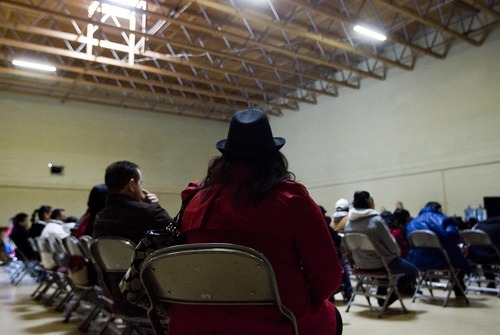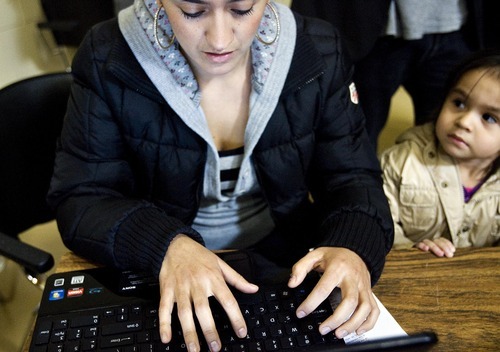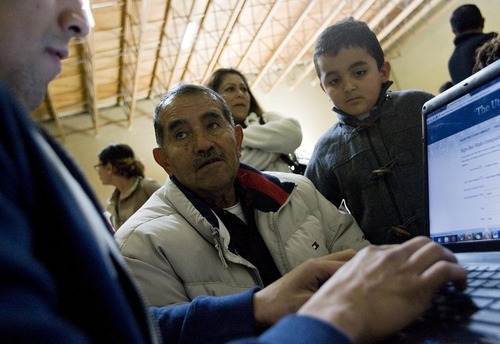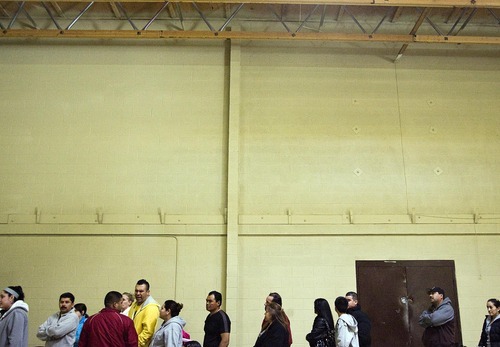This is an archived article that was published on sltrib.com in 2011, and information in the article may be outdated. It is provided only for personal research purposes and may not be reprinted.
The young woman stood alone in the back of the meeting hall, tears streaming down her cheeks.
On Sunday, she had come to Centro Civico Mexicano in Salt Lake City for an update on enforcement-only immigration legislation and several other measures being considered by state lawmakers targeting undocumented immigrants.
Several Latino organizations sponsored the meeting to support The Utah Compact, an alternative concept that supporters say seeks "reasonable" policies addressing immigrants and urges leaving immigration reform up to the federal government.
Despite snowstorms and low temperatures, more than 300 people attended the daylong event. Many waited in line to write letters or send e-mails to Utah lawmakers.
"I'm an illegal. There — I've said the word," said the weeping woman. "It's always been very shameful to me. Not even my closest friends know — they wouldn't be my friends if they did. This is my home, but there's a lot of hatred out there."
The 22-year-old woman said she grew up in West Valley City, and just graduated from the University of Utah with a Bachelor of Science degree.
"There's nothing I can do with my degree," she said. "I can't get a job, a driver's license or a Social Security card. What kind of a life will I have?"
A few feet away, 13-year-old Andrea Dutierrez said she came to support "others who are struggling against unfair [immigration] laws that hurt people and separate families.
"I'm a U.S. citizen, so I have a future," she said. "I want other people to have a future, too."
Tony Yapias, director of Proyecto Latino de Utah, said the immigration bill before the Utah Legislature is traumatizing the Latino community.
HB70, sponsored by Rep. Stephen Sandstrom, R-Orem, initially called for police to verify the legal status of anyone they may question but was amended to call for it only in more serious violations — felonies and class A misdemeanors — and allow officers to use their discretion in class B and C misdemeanors.
The House passed the bill Friday and sent it to the Senate.
Despite the amendment, Yapias said the bill would still be unconstitutional because of what he called the "profiling" aspect of its language. He said the American Civil Liberties Union has advised his group that the bill also could lead to abuse.
"About 20 to 25 police officers are fired or disciplined a year for misconduct," said Yapias. "That usually has to do with abusive treatment of someone they detain."
Yapias said HB70's language could open the door for harassment of people simply because of the way they look.
Yapias called on the Utah congressional delegation to ensure that the federal government "does its job by focusing on immigration reform. Utahns are frustrated but the answer is with the federal government, not state legislatures."
Alfredo Lopez, 41, who works in the construction industry, said he can't understand why the United States fights for human rights "everywhere in the world except inside this country for the people who are already here. In the U.S., people are attacking the Hispanic community when all we want to do is work."
An undocumented 38-year-old woman said that when any of her five children see a police car, "they get afraid. They think they will do something terrible to us if I'm pulled over."
She said she will not go back to Mexico "because there's nothing there. All my children are U.S. citizens, so they can get an education and grow up to have good jobs. Unless the police come and send me back, we're staying."
The woman said she pays taxes, works full time in a food-service job and gets child support from her ex-husband, but receives no welfare or government assistance.
"I obey the law and teach my children to be good," she said. "The only thing I've done is get a fake Social Security number because it's the only way I can work."









